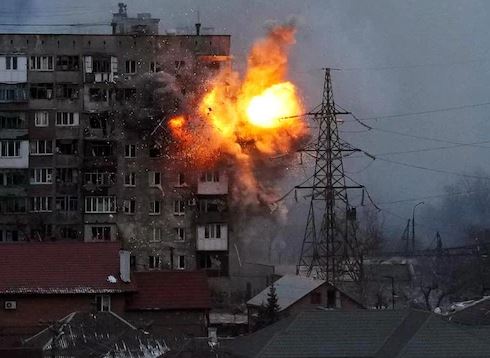Kyiv: Russian forces Sunday pummelled a hulking steel plant that held the last pocket of resistance in Mariupol, a southern Ukraine city that has suffered under siege for six weeks and whose capture would aid Moscow’s plans for a full-scale offensive in the country’s east.
With the last Ukrainian fighters in Mariupol refusing to surrender, Ukrainian President Volodymyr Zelenskyy said Russia was “deliberately trying to destroy everyone who is there”.
He said Ukraine needs more heavy weapons from the West immediately to have any chance of saving the port city on the Sea of Azov.
“Either our partners give Ukraine all of the necessary heavy weapons, the planes, and without exaggeration immediately, so we can reduce the pressure of the occupiers on Mariupol and break the blockade,” he said, “or we do so through negotiations, in which the role of our partners should be decisive”.
Earlier, Zelenskyy had told Ukrainian journalists that the continuing siege of Mariupol, which has come at a horrific cost to trapped and starving civilians, could scuttle attempts to negotiate an end to the war.
A Russian Defence Ministry spokesman on Saturday said Ukrainian forces had been driven out of most of the city and remained only in the Azovstal steel mill, where tunnels allowed the defenders to hide and resist until they ran out of ammunition.
The Russians already control what is left of the city after weeks of bombardment. Striking the steel plant to take the rest is part of Russia’s preparations for the anticipated assault in eastern Ukraine.
Capturing Mariupol would allow Russian forces in the south, which came up through the annexed Crimean Peninsula, to fully link up with troops in the Donbas region, Ukraine’s eastern industrial heartland and the focus of the anticipated offensive.
Ukraine’s deputy defence minister Hanna Malyar said on Sunday that Mariupol’s defenders had tied up significant Russian forces besieging the city.
Malyar described the city as a “shield defending Ukraine” that prevented the Russian troops encircling the city from advancing to other areas of the country.
She said the Russians had continued to hit Mariupol with airstrikes and appeared to be preparing an amphibious landing to beef up their forces in the city.
Meanwhile, scattered Russian attacks elsewhere in Ukraine were an explosive reminder to Ukrainians and their Western supporters that the whole country remains under threat from an invasion now in its eighth week.
After failing to capture Ukraine’s capital and the humiliating loss of the flagship of its Black Sea Fleet, Russia’s military command had vowed to step up missile strikes on capital Kyiv.
The Russians said they hit an armoured vehicle plant Saturday, a day after targeting a missile plant.
Kyiv Mayor Vitali Klitschko said Saturday’s strike killed one person and wounded several. He advised residents who fled the city earlier in the war not to return.
“We’re not ruling out further strikes on the capital,” he said. “If you have the opportunity to stay a little bit longer in the cities where it’s safer, do it.”
Russian Defence Ministry spokesman Igor Konashenkov said the plant was among multiple Ukrainian military sites hit with “air-launched high-precision long-range weapons”.
The Ukrainian president’s office reported missile strikes and shelling in eight regions across the country between Friday and Saturday.
The governor of the Lviv region in western Ukraine, which has been only sporadically touched by the war’s violence, reported airstrikes on the region by Russian Su-35 aircraft that took off from neighbouring Belarus.
In Kharkiv in the northeast, Mayor Ihor Terekhov said three people were killed and 34 wounded on Saturday. One explosion believed to have been caused by a missile sent rescue workers scrambling near an outdoor market. The workers said one person was killed and at least 18 wounded.
“All the windows, all the furniture, all destroyed. And the door, too,” recounted stunned resident Valentina Ulianova.
The day before, rockets hit a residential area of Kharkiv, killing a 15-year-old boy, an infant and at least eight other people in Ukraine’s second-largest city, officials said.
Nate Mook, a member of the World Central Kitchen NGO run by celebrity chef José Andrés, said in a tweet that four workers in Kharkiv were wounded by a strike. Andrés tweeted that staff members were unnerved but safe.
Austrian Chancellor Karl Nehammer, who met with Vladimir Putin this past week in Moscow — the first European leader to do so since the invasion began on February 24 — said the Russian president is “in his own war logic” on Ukraine.
In an interview on NBC’s “Meet the Press”, Nehammer said he thinks Putin believes he is winning the war and “we have to look in his eyes and we have to confront him with that, what we see in Ukraine.”
Nehammer said he told Putin what he saw during a visit to the Kyiv suburb of Bucha, where more than 350 bodies have been found along with evidence of killings and torture under Russian occupation, and “it was not a friendly conversation”.
Zelenskyy estimated that 2,500 to 3,000 Ukrainian troops have died in the war, and about 10,000 have been wounded.
The office of Ukraine’s prosecutor general on Saturday said at least 200 children had been killed, and more than 360 wounded.
Russian forces also have taken captive some 700 Ukrainian troops and more than 1,000 civilians, Ukrainian Deputy Prime Minister Iryna Vereshchuk said on Saturday.
Ukraine holds about the same number of Russian troops as prisoners and intends to arrange a swap but is demanding the release of civilians “without any conditions”, she said.
Russia’s warning of stepped-up attacks on Kyiv came after it accused on Thursday Ukraine of wounding seven people and damaging about 100 residential buildings with airstrikes in Bryansk, a region bordering Ukraine. Ukrainian officials have not confirmed hitting targets in Russia.
Russian Maj. Gen. Vladimir Frolov, whose troops have been among those besieging Mariupol, was on Saturday buried in St. Petersburg after dying in battle, Gov. Alexander Beglov said.
Ukraine has said several Russian generals and dozens of other high-ranking officers have been killed in the war.
AP







































